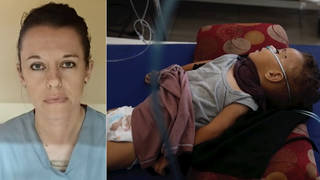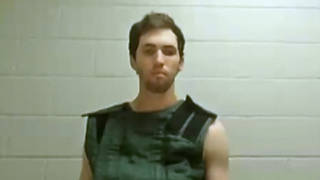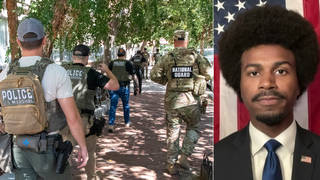
Topics
Guests
- Benjamin Jealoussenior fellow at the Center for American Progress, former NAACP president and CEO.
From Baltimore to Ferguson to New York, Wednesday was a major day for criminal justice news. In Baltimore, a mistrial has been declared in the case of one of the police officers charged in the death of Freddie Gray. Gray died in April from a spinal injury sustained while being transported in the back of a police van. Meanwhile in Ferguson, Missouri, officials say they have reached the outlines of a deal with the Justice Department that would force changes to the city’s police department and head off a civil rights lawsuit alleging years of unconstitutional policing. We speak to Benjamin Jealous, senior fellow at the Center for American Progress. He’s the former NAACP president and CEO.
Transcript
AMY GOODMAN: When we come back from our next break, we’re going to Flint, Michigan, to talk about a state of emergency that’s been declared by the first woman mayor of Flint. Why? It involves the water supply. What does water and democracy have to do with each other? You’ll find out. But now we’re staying in Maryland. Nermeen?
NERMEEN SHAIKH: From Baltimore to Ferguson to New York, Wednesday was a major day for criminal justice news. In Baltimore, a mistrial has been declared in the case of one of the police officers charged in the death of Freddie Gray. Gray died in April from a spinal injury sustained while being transported in the back of a police van. Meanwhile in Ferguson, Missouri, officials say they have reached the outlines of a deal with the Justice Department that would force changes to the city’s police department and head off a civil rights lawsuit alleging years of unconstitutional policing.
AMY GOODMAN: And here in New York, the state has agreed to overhaul the system of solitary confinement in state prisons, following a three-year legal battle with the New York Civil Liberties Union.
To talk more about these issues, we’re joined by Ben Jealous, senior fellow at the Center for American Progress. He is the former NAACP president and CEO. He’s joining us from Baltimore.
Ben, welcome back to Democracy Now! Let’s start where you are, in Baltimore. You have this hung jury. You have a mistrial. Twelve jurors—I believe eight of them were black, four of them were white—trying a black police officer in the death of Freddie Gray, an African-American resident of Baltimore, who lived not far from where William Porter lived. Can you talk about the significance of the mistrial, the issue of race and policing in this country?
BENJAMIN JEALOUS: Yeah, look, the mistrial is, in some ways, oddly, good news, inasmuch as it means that the prosecutor’s argument was getting traction with many jurors. In these sorts of cases, cops are about half as likely to be convicted when charged with the same crimes as civilians—in this case, murder. And so, it does suggest that the prosecutors here were perhaps being more successful than prosecutors are in most places. And the fact is that most of the time when you go to a second trial, the person is convicted. And so there is reason to be hopeful here that justice will be done for Freddie Gray.
NERMEEN SHAIKH: And, Ben Jealous, you’ve been working on recommendations for reforming the Baltimore Police Department. Could you talk about what some of the recommendations are that you’ve been making?
BENJAMIN JEALOUS: Yeah. The first one is that we’ve got to fire more bad cops. The second one is, is that we have to stop imposing a gag order on victims of brutality. The bottom line is that we’ve got to increase trust. I mean, we’re in a city that has two crises, has twin crises. On the one hand, murders are going up; on the other hand, we’ve had a sustained spate of horrible police brutality cases. And the reality is that we have to increase trust to solve more homicides, but we’re not going to increase trust until people can trust that the cops will treat them fairly and not beat them up or kill them.
NERMEEN SHAIKH: So what are some of the recommendations that you make towards that end?
BENJAMIN JEALOUS: Sure, yeah. So, first thing, we’ve got to fire more bad cops. Two, we’ve got to get rid of the gag order on victims of brutality. You know, three, we’ve got to roll out the body cameras even faster. We also got to shift, frankly, to more of a—you know, we have to shift the priorities from kind of low-level drug offenses to serious crimes. Those are, I say, the four big ones that we’ve been focused on.
We also, frankly, have a need for just basic transparency. We found out this summer that most of the—excuse me, many of the precincts were closed after 7:00 p.m. And the young man who figured that out and exposed it was told, “Because, well, quite frankly, it’s dangerous after 7:00 p.m.” Well, that’s why we need the precincts open. But people didn’t know, because here, unfortunately, unlike Los Angeles, we do not publish the practices and the policies of the cops where folks can find them, and we need to start doing that.
AMY GOODMAN: In the testimony around William Porter—and do you think you’re going to find this in the other cases, in the other trials?—they defend themselves by criticizing the police department, so that you gain more information about how the police department works.
BENJAMIN JEALOUS: You know, look, you know, that’s right. And the reality is that the department here has a lot of work that needs to be done to make it even more effective. We’re the 26th largest city. We have the eighth largest department. And quite frankly, we should be getting more value from it as citizens here. We should feel like they are some of the best prepared and most professional on the planet. And unfortunately, the way in which this department has continued to tolerate bad officers and hide their misdeeds and, quite frankly, not been as effective as they could be in getting killers off the streets has left people really wanting more on all sides.
NERMEEN SHAIKH: Well, one of your recommendations, Ben Jealous, is to have police cameras used in the Baltimore Police Department. They already have a pilot program testing that.
BENJAMIN JEALOUS: Right.
NERMEEN SHAIKH: What’s your response to that?
BENJAMIN JEALOUS: Well, we have a pilot program that they’re saying is going to take four years to get, you know, fully out there, when we’ve seen similar cities do it in six months. And what’s even more concerning is that they want the cops to have full control of the data, rather than for the city to own it. And the city needs to own that data, so that it can be used not just in prosecution, but also in defense, and, quite frankly, so that the City Council and the mayor can actually have line of sight into what the officers are doing.
AMY GOODMAN: Ben, can you talk about what’s happening right now in Ferguson, Missouri? What kind of deal has been reached with the authorities and the local police department?
BENJAMIN JEALOUS: Yeah, look, this deal will provide for more training. It will let folks kind of be like—sort of trust that the federal government is going to stay engaged and going to monitor and look over the department for some time. There will be increased transparency, you know, and that’s a reason for hope. I mean, the most important thing in Ferguson is for the activists in the street of Ferguson to really stay engaged. You know, this simply makes it easier to reform their department. This is not the change, if you will, that they were seeking. It simply creates a better context for making change happen.
NERMEEN SHAIKH: Well, Benjamin Jealous, you’ve written recently about some of the reforms that were undertaken in the Cincinnati Police Department after officers killed the 19-year-old African American, Timothy Thomas, in 2001. Could you talk about what some of those reforms were and how they’ve impacted policing in Cincinnati?
BENJAMIN JEALOUS: Yeah, look, you know, I can recall going back to Cincinnati to actually study the department after the reforms were starting to be made. And what you see is a city that, you know, now has begun to move in the right direction. The reality is, I think what you’re seeing across the country is the disruptive and powerful force of everybody having a video camera in their pocket. I mean, even the reforms that we were making back in the early 2000s, quite frankly, weren’t enough, and what we’re seeing on video, you know, from cities across the country, including many in Ohio, these days, is that we need to push further.
But, you know, one of the things—I mean, things that they started to do there were to get people out of their cars and actually talking to people, building relationships, being more transparent about policies, you know, frankly, being more focused on getting bad cops off the street, better training around use of force. And that’s—those are many of the reforms that need to happen. But at the same time, I think, as a country, we have to brace ourselves for the reality that we’re going to continue to see more of the worst of what happens in our streets by the people who have sworn to protect and respect us, simply because everybody now has a video camera in their pocket.
The good news is that the sort of transparency and, quite frankly, shame that that makes possible will lead to change. You know, light changes things. Visibility changes things. And us finally seeing what so many officers have done in the past, but were able to deny, that they could no longer, frankly, deny, is painful as a country, but it does give us reason to hope that better days are in front of us.
AMY GOODMAN: Ben Jealous, in Chicago, do you think that the police killing of Laquan McDonald—now, the officer now has six first-degree murder charges against him, but now there’s calls for the mayor to resign. It was all kept hush-hush. In fact, Laquan was killed more than a year ago, through the mayoral re-election. Just yesterday, Mayor Emanuel was at a charter school, and the kids started chanting “16 shots! 16 shots!” Do you think this could lead to the resignation of Mayor Emanuel?
BENJAMIN JEALOUS: You know, I’m not sure what will happen. And I really hope folks continue to dig to find out what actually happened, because the reality is that the black community played a critical role in putting him back in office. And so, it would make sense, if you will, that somebody on his team would try to hide this. We need to know whether it was him, whether it was somebody else. And yes, I think that activists in the city should keep the heat turned up as high as possible until we know what actually happened, because if they—you know, if the mayor actually intentionally acted to keep this from public view in order to get back in office, then, yes, he should—he should step down. But until we know that, we need to just keep pushing for the full truth to come out.
AMY GOODMAN: Well, Ben Jealous, an issue you’ve been long involved with is the issue of executions in the United States. And a new report shows that executions in this country have dropped to their lowest level in a quarter of a century. Of the 28 executions carried out this year, 13 took place in Texas, six in Missouri, five in Georgia. The Death Penalty Information Center says a total of 49 new death sentences were imposed this year, the lowest number since the early ’70s. Can you talk about the significance of this and if you think we will see the end of the death penalty in the United States, something you have been pushing for state by state?
BENJAMIN JEALOUS: Yeah, look, you know, we are close. We can see the end. It will happen, Amy, in my lifetime and in yours. But what’s real is that we have to keep pushing state by state. I think, as activists, we can take pride in the fact that campaigns like the Troy Davis campaign really have forced this country to think about what we do in the dark, typically, in a remote prison, in a remote room, where we execute people and do something that no other Western country does. All of our peers have banned this. We need to ban it, too.
And so, you know, what you’re seeing now, right—first we saw public opinion fall, after the Too Much Doubt campaign around the case of Troy Davis—the man who was actually innocent but was executed nonetheless in Georgia. You know, now you’re starting to see that same drop in public opinion have an impact on juries, have an impact on judges. And so, you know, this is what we call an evolving standard of decency. Our country is catching up with its own values, catching up with the values of the rest of the Western world. And that’s good news. I think we should all take heart that as a country we can continue to evolve. And that’s ultimately, on these tough criminal justice issues, the only thing that can really give us hope.
NERMEEN SHAIKH: And very quickly, Ben Jealous, before we conclude, on another criminal justice issue, here in New York, the state has agreed to overhaul the system of solitary confinement in state prisons, following a three-year legal battle by the New York Civil Liberties Union. Could you comment on the significance of that?
BENJAMIN JEALOUS: Look, this is huge. I think it’s hard for most people to understand. We want to believe that the people who get into solitary confinement are just the worst monsters in our society. The reality is much more complex. Oftentimes these are just people with basic mental problems, who find themselves in jail and offend a guard and are put into solitary and, in a state like New York, could have remained in a 6-by-10 box for years with virtually no mental healthcare, no treatment, just simply tortured. And that’s why it’s so important that the ACLU has done what they’ve done in so many instances and chosen to advocate for people that everybody else would rather not think about or, quite frankly, would rather pretend were something other than what they are. Again, oftentimes in New York state, what was found was that just very mentally ill people, who were put into jail or to prison for very basic crimes, ended up in solitary confinement, as if they were the worst monsters in the world, simply because a guard did not want to deal with this person’s mental problems and found it easier to just lock them away in a box for years. And it’s a good thing for civilization that the ACLU brought this challenge, that the judge saw the light and that this practice will be ended.
AMY GOODMAN: It’s actually the New York Civil Liberties Union. And, Ben, thanks so much for being with us. Ben Jealous, senior fellow—
BENJAMIN JEALOUS: The ACLU affiliate in New York.
AMY GOODMAN: Right—senior fellow at the Center for American Progress. He’s the former NAACP president and CEO. Thanks for joining us from Baltimore.
This is Democracy Now! When we come back, water, democracy and Flint, Michigan. Stay with us.












Media Options